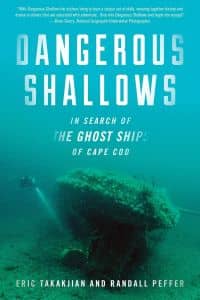ME Other Non-Fiction
There are many books written about Merchant Ships during the World Wars and in Modern Times. This section lists some of them.

- Details
- By: Diana Preston
- Title: The Evolution of Charles Darwin: The Epic Voyage of the Beagle That Forever Changed Our View of Life on Earth
- First Published by: Atlantic Monthly Press
- First Published Format: HC
- First Published Date: 17 Nov 2022
- ISBN-10: 0802160182
- ISBN-13: 978-0802160188

- Details
- By: Randall Peffer and Eric Takakjian
- Title: Dangerous Shallows: In Search of the Ghost Ships of Cape Cod
- First Published by: Lyons Press
- First Published Format: K
- First Published Date: 24 January 2020

- Details
- By: Geoffrey Bond
On 19 December 1963, the Greek-owned cruise-liner Lakonia departed Southampton for an eleven-day Christmas cruise to the Canary Islands. She was carrying 646 passengers - all of whom were British apart from 21, and a crew of 376 who were a mixture of Greeks and Germans. At 2300 hrs 22 December, they were about 200 miles north of Madeira when a fire was discovered in the hairdressing salon. Fire alarms and other warning systems, however, were so ‘quiet’ they were not heard by either the passengers or those who were required to respond! At that time, most of the passengers were partying in the main ballroom and dismissed the first suggestions of smoke as probably being from cigars. Captain Zarbis attempted to use the ships public address system only to discover it was already out of action. Still nobody warned the passengers and it was only when smoke began to fill the ballroom that the band stopped playing. What then followed included considerable confusion, allegations of looting by crew members and instructions which were either unclear or impossible to follow. Many of those who had already retired, were to die in their cabins.
Even the first distress call made by the chief radio officer was broadcast long after it might have been sent. Within an hour of that call, however, he had no option but to leave his post because the fire was spreading so rapidly. As it did so, boilers began to explode and a number of lifeboats were also lost.
Curiously it was the ship's purser who gave the order to abandon ship and this was done shortly before 0100 hrs. This was just under 3 hours since the fire was first seen but already too late for many of those on board with more fatalities to come. The ship itself held all the appropriate documents and licenses required by the Greek system for registering passenger-carrying vessels. In addition, she had also been inspected and passed ‘fit for purpose’ by the proper British authorities immediately before sailing. Nevertheless, several of those boats which were not burned had unserviceable fittings, rusting chains and other problems which caused two to capsize during launching with loss of life. Eventually only half of the ship’s lifeboats were safely launched - and many of those were less than half full. Now where have we heard that one before!
Altogether, 128 persons lost their lives in this almost-forgotten tragedy from 1963. When things go wrong at sea, fire and water can become two of the greatest killers and here they had combined to create yet another disaster at sea. Such calamities on passenger-ships and cruise-liners were all too frequent in the 20th Century and, judging by much more recent events, it is something which does not appear likely to change anytime soon!
- Title: Lakonia
- First Published by: Oldbourne Press
- First Published Format: HC
- First Published Date: 1966

- Details
- By: Geoffrey Bond
It was Monday, June 17th, 1940.
Along the French coast a bewildered, battered army had crowded the beaches and filled the little ports, waiting to be picked up and taken back across the Channel.
Lying off St Nazaire was the liner Lancastria, 16,000 tons of elegance and steel, in which more than four thousand men, packed into every suitable inch of space, could be carried to safety. Between seven and eight that morning, the first boats began to ferry their human cargoes out to the liner: airmen, pioneers, infantrymen, engineers, gunners, even 38 civilians.
Around the Lancastria a group of ships was lying, all too vulnerable in those shallow waters. The Oronsay had already been hit. Then, about four o’clock in the afternoon – “At eight bells at the end of the afternoon watch” – the Lancastria was struck by bombs, and turned over and sank.
This was, it is true, a maritime disaster of the first magnitude; and yet, such was a heroism and fortitude it evoked, it will always be remembered with a sense of national pride.
Geoffrey Bond tells the whole story for the first time. He follows individuals and units across France to St Nazaire; he tells what these people were doing when the bomb struck; he follows them into the water, and for the lucky ones, to England and safety.
All records of the Lancastria Survivors’ Association had been opened to him. In addition, he has personally interviewed hundreds of men of all units who were there. His story is factual, intensely moving, gripping. As the tension mounts, page by page, here, in clear, compelling prose, is the very stuff of war. A full record of tragedy, irony, infamy and human bravery.
- Title: Lancastria
- First Published by: Oldbourne Press
- First Published Format: HC
- First Published Date: 1959

- Details
- By: Stephen Fox
This book has been released under the following alternate titles:-
Transatlantic: Isambard Kingdom Brunel, Samuel Cunard and the Great Atlantic Steamships
- Title: The Ocean Railway: Isambard Kingdom Brunel, Samuel Cunard and the Revolutionary World of the Great Atlantic Steamships
- First Published by: Harper Collins
- First Published Format: HC
- First Published Date: 1 September 2003
- ISBN-10: 0002571854
- ISBN-13: 978-0002571852

- Details
- By: Diana Preston
- Title: Wilful Murder: The Sinking of the Lusitania
- First Published by: Doubleday
- First Published Format: HC
- First Published Date: 1 May 2002
- ISBN-10: 0385601735
- ISBN-13: 978-0385601733